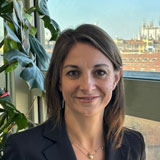Human Genome Biology in health and disease
In our lab we are interested in understanding the function of DNA repetitive elements in the epigenetic regulation of the transcriptional response of the cell. In particular, we are asking whether DNA repeats could influence the inter-individual variability between humans in terms of response to environmental cues, adaptation and predisposition to human diseases. DNA repeats cover almost 70% of the human genome, and their function was largely ignored for decades. Nevertheless, there are emerging evidences of the peculiar role of repeats in regulating the epigenome. For instance, DNA repeats are involved in chromosome structural organization, gene regulation, genome integrity, and evolution. Moreover, a plethora of potential functions for expressed repeat regions have been assayed using data generated by the ENCODE and FANTOM consortia. These studies indicate a functional role for repetitive DNA in cell identity by means of repeat- encoded, ncRNA-mediated mechanisms, acting both in cis and in trans. The work of our team may provide important mechanistic information and novel interpretation of how specific non coding DNA functions may directly influence cellular processes, such as differentiation and disease. Ultimate goal that to demonstrate that evolutionary acquisition of such elaborated fine modulation of transcription represent an added value for mammalians, and humans in particular, to react to environment, adapt to stress, and eventually predispose to better or worse outcomes in disease progression. Such an effort in elucidating DNA repeats molecular mechanisms might at the end get genome biology and epigenetics research closer to truly effective forms of personalized medicine.
Projects
- Study of the transcriptional dynamics of LINE1 transposons in the identity and cellular plasticity of primary human CD4 + T lymphocytes circulating and infiltrating the tumor
- Study of the epigenetic role of LINE1 elements and derived transcripts in the maintainance of human T-cell quiescence
- Role of Transposable elements expression in colorectal cancer
Team
| Nome / Name | Ruolo / Role | |
|---|---|---|
| Amanda Bianca | Master Student | bianca@ingm.org |
| Filippo Burattin | PostDoc | burattin@ingm.org |
| Marco Cominelli | Master Student | cominelli@ingm.org |
| Valeria Di Gioia | PhD student | digioia@ingm.org |
| Marco Gritti | Master Student | gritti@ingm.org |
| Simone Locatelli | Master Student | locatelli@ingm.org |
| Federica Marasca | Research Scientist | marasca@ingm.org |
| Maria Chiara Palma | Predoctoral fellow | palma@ingm.org |
| Francesco Panariello | PostDoc | panariello@ingm.org |
| Michele Panepuccia | PhD Student | panepuccia@ingm.org |
| Benedetto Polimeni | PostDoc | polimeni@ingm.org |
| Valeria Ranzani | Research Scientist, Bioinformatician | ranzani@ingm.org |
| Marta Sacco | Master Student | sacco@ingm.org |
| Giulia Solbiati | Predoctoral Fellow | solbiati@ingm.org |
| Alen Stambolliu | PhD Student | stambolliu@ingm.org |
| Rebecca Vadalà | PostDoc | vadala@ingm.org |
| Jan Zamporlini | Fellow | zamporlini@ingm.org |
Publications
- LINE1 elements are spliced in non-canonical transcript variants to control gene expression in human T cell quiescence and exhaustion
Marasca F, Sinha S, Vadalà R, Polimeni B, Ranzani V, Paraboschi E, Burattin FV, Ghilotti M, Crosti MC, Negri ML, Campagnoli S, Notarbartolo S, Bianchi AS, Siena S, Prati D, Montini G, Viale G, Torre O, Harari S, Grifantini R, Soldà G, Biffo S, Abrignani S, Bodega B.
Nat Genet. 2022 Jan 17, doi: 10.1038/s41588-021-00989-7. Online ahead of print. - Early maternal care restores LINE-1 methylation and enhances neurodevelopment in preterm infants
Fontana C, Marasca F, Provitera L, Mancinelli S, Pesenti N, Sinha S, Passera S, Abrignani S, Mosca F, Lodato S, Bodega B, Fumagalli M.
BMC Med. 2021 Feb 5;19(1):42. - 3D COMBO chrRNA-DNA-ImmunoFISH.
Marasca F, Cortesi A, Bodega B.
Methods Mol Biol. 2021;2157:281-297. - The Sophisticated Transcriptional Response Governed by Transposable Elements in Human Health and Disease
Marasca F, Gasparotto E, Polimeni B, Vadalà R , Ranzani V, Bodega B.
Int J Mol Sci. 2020 Apr 30;21(9):E3201. - 3D Multicolor DNA FISH Tool to Study Nuclear Architecture in Human Primary Cells
Marasca F, Cortesi A, Manganaro L, Bodega B.
J Vis Exp 2020 Jan 25;(155). - Dysfunctional polycomb transcriptional repression contributes to Lamin A/C dependent muscular dystrophy
Bianchi A, Mozzetta C, Pegoli G, Lucini F, Valsoni S, Rosti V, Petrini C, Cortesi A, Gregoretti F, Antonelli L, Oliva G, De Bardi M, Rizzi R, Bodega B, Pasini D, Ferrari F, Bearzi C, Lanzuolo C
J Clin Invest. 2020;130(5):2408-2421. - 4q-D4Z4 chromatin architecture regulates the transcription of muscle atrophic genes in Facioscapulohumeral muscular dystrophy
Cortesi A, Pesant M, Sinha S, Marasca M, Sala E, Gregoretti F, Antonelli L, Oliva G, Chiereghin C, Soldà G, Bodega B*.
Genome Res. 2019 May 16. pii: gr.233288.117. doi: 10.1101/gr.233288.117. [Epub ahead of print] - How Polycomb-Mediated Cell Memory Deals With a Changing Environment: Variations in PcG complexes and proteins assortment convey plasticity to epigenetic regulation as a response to environment.
Marasca F, Bodega B, Orlando V.
Bioessays. (2018) 40(4):e1700137 - A cytosolic Ezh1 isoform modulates a PRC2-Ezh1 epigenetic adaptive response in postmitotic cells.
Bodega B, Marasca F, Ranzani V, Cherubini A, Della Valle F, Neguembor MV, Wassef M, Zippo A, Lanzuolo C, Pagani M, Orlando V.
Nat Struct Mol Biol (2017) 24:444-452 - The long intergenic noncoding RNA landscape of human lymphocytes highlights the regulation of T cell differentiation by linc-MAF-4.
Ranzani V, Rossetti G, Panzeri I, Arrigoni A, Bonnal RJ, Curti S, Gruarin P, Provasi E, Sugliano E, Marconi M, De Francesco R, Geginat J, Bodega B, Abrignani S, Pagani M.
Nat Immunol (2015) 16:318-325 - Repetitive elements dynamics in cell identity programming, maintenance and disease.
Bodega B, Orlando V.
Curr Opin Cell Biol (2014) 31:67-73








